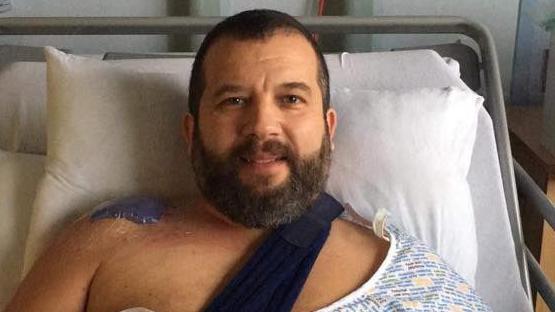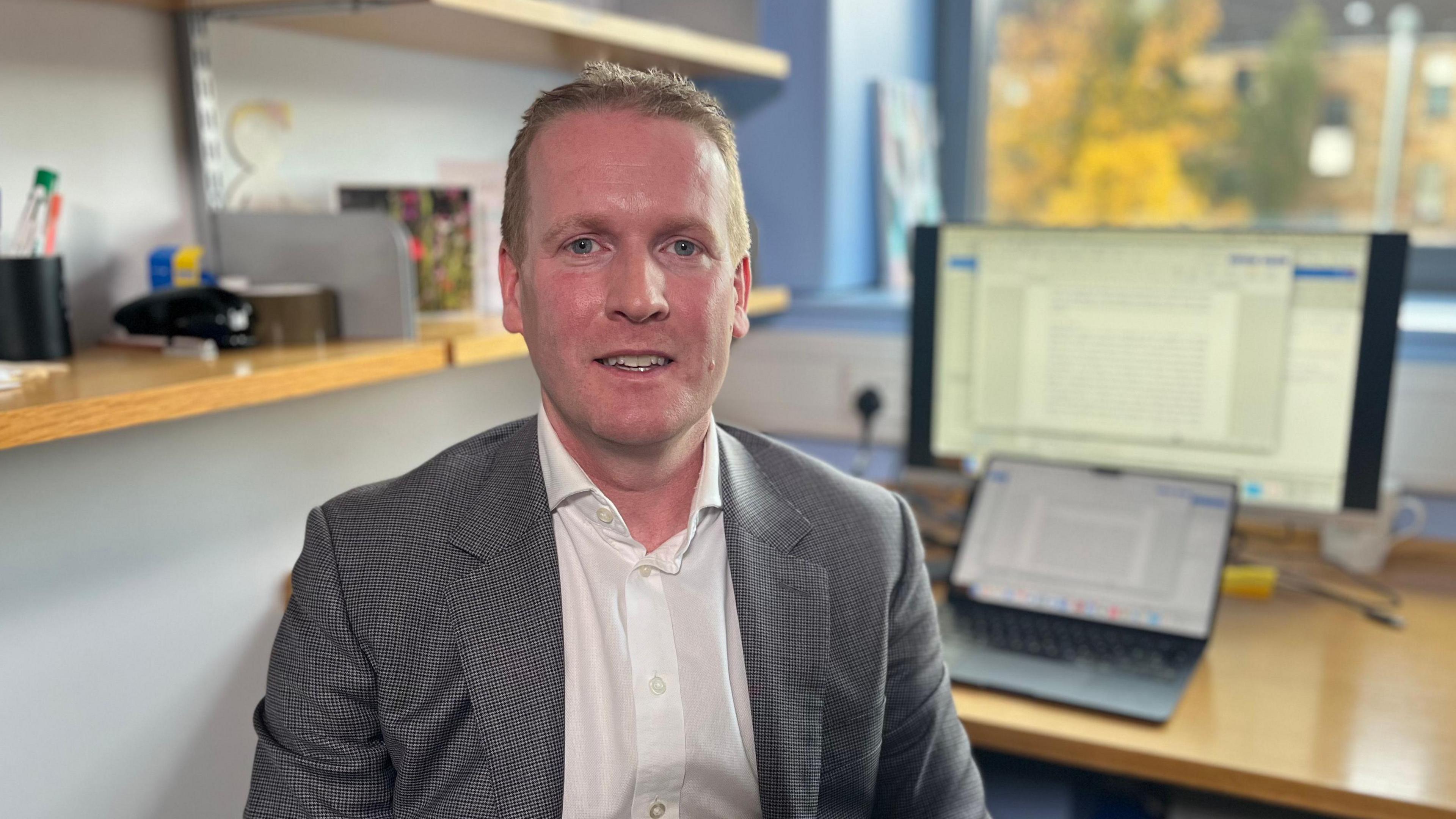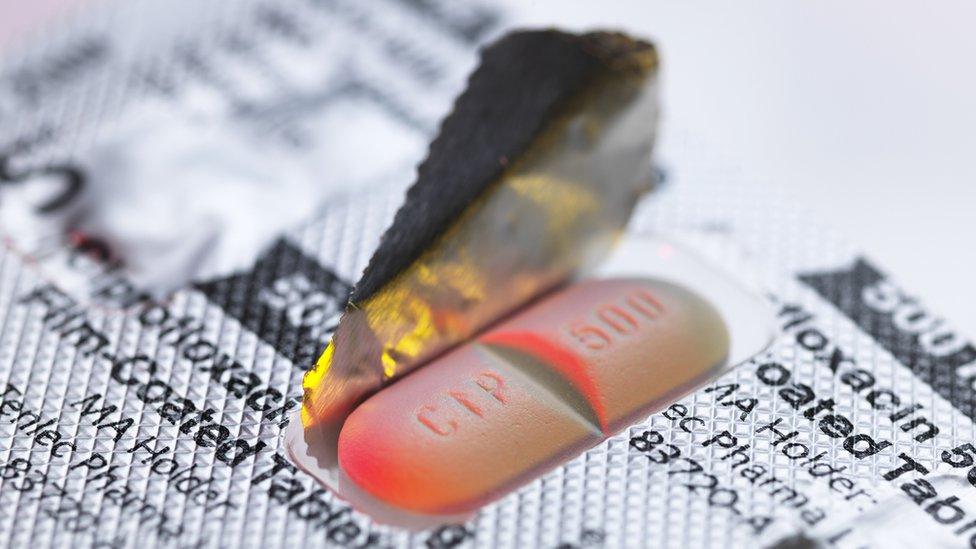Antibiotic side effects left me barely able to walk

John Marshall in hospital after surgery to reattach a bicep tendon in 2019
- Published
John Marshall used to enjoy running but after a serious reaction to antibiotics in 2017 he was left barely able to walk.
The 51-year-old from Kirkcaldy says his health changed dramatically after just a couple of days of taking a group of antibiotics called fluoroquinolones.
"Every joint was sore and I mean every joint: fingers, elbows, toes, ankles - everything," he says.
"It was stabbing pains, jumping pains. My muscles were twitching. They were out of control."
Campaigners raising awareness about rare adverse reactions to the drugs call this being 'floxed'.
Seven years later, John is still suffering from chronic pain and regular muscle spasms.
Fluoroquinolone antibiotics can be life-saving drugs when used against specific bacteria - and serious side effects are considered rare.
However, almost a year ago new guidance was issued that they should only be used in limited circumstances, external, where more commonly recommended antibiotics were not suitable.
The UK medicines regulator MHRA warned that fluoroquinolones were linked to rare but occasionally severe and irreversible side effects, including tendon rupture, muscle and joint pain and nerve problems.
It issued new guidance which strengthened previous warnings of complications, including the risk of suicidal thoughts and behaviours associated with fluoroquinolone antibiotics.

John Marshall was diagnosed with fluoroquinolone-associated disability
Despite the new guidance, a leading expert has told BBC Scotland News doctors are still over-prescribing.
Prof Neal Millar is one of only a handful of clinicians in the UK who specifically treat the disabilities associated with 'fluoroquinolone toxicity'.
Fluoroquinolones are a class of antibiotics that include ciprofloxacin, delafloxacin, levofloxacin, moxifloxacin, and ofloxacin – these medicines may also have a brand name.
In Scotland, they accounted for 2.4% of the total antibiotics used in 2023 but they are still taken by many thousands of people.
Figures from the NHS show that the number of daily doses of fluoroquinolones has decreased in Scotland by almost a fifth in the past four years but Prof Millar says his clinic is busier than ever.
He believes prescribing rates remain high because the message about overuse is not getting through to GPs and other doctors.

Prof Neal Millar is a professor of orthopaedic surgery at the University of Glasgow and is a specialist in fluoroquinolone toxicity and associated disability
Since 2015, Prof Millar has treated about a thousand patients from across the UK and hundreds of Scots, including John, who was prescribed the drugs in hospital to treat a serious infection following a vasectomy.
After he left hospital, John went to his GP with symptoms including joint pain.
His doctor told him joint pain could happen with this kind of antibiotic and it would pass when he stopped taking them.
However, John says they are still having a drastic impact on his life.
"I wake up basically every night with spasms across my tendons and my knees to the point where physically my brain will not allow me to straighten my legs," he says.
"I've got to use my other leg to straighten my leg - it's that level of pain."
Two years after taking the pills, an MRI showed that he had a ruptured bicep tendon which required surgery to reattach it.
"I just got up one morning with a very painful shoulder," he said.
"I'd done nothing, I hadn't moved, I hadn't lifted anything, I hadn't been working, I hadn't been exercising.
"For three months I had to sit up in bed and sleep sitting up. So these drugs have caused big, big issues in my life."
Yellow card
John is part of a growing worldwide community of so-called 'floxies' - people who say they have been harmed by these medications.
He worries that many people don't know how to report side-effects - masking the real numbers of those affected.
The MHRA (Medicines and Healthcare products Regulatory Agency) estimates that adverse reactions occur in between one and 10 people in every 10,000 who take fluoroquinolones.
But the watchdog's 'yellow card' system to record these events relies on voluntary reporting by patients and healthcare professionals.
Prof Millar believes there are issues around underreporting of symptoms.
He says that when the drugs are used for the right reasons they can be life-savers but doctors are often using them unnecessarily.
"There's no doubt that if you had a specific bacteria and you're unwell, it's going to help you," he says.
"I think the problem with this drug is it has been prescribed in a sort of wide fashion because of guidelines that are outdated, for urinary tract infections, for prophylaxis (to prevent disease).
"They were prescribed in large quantities throughout the 80s, 90s and 2000s, mostly because guidelines at that stage thought that they were the best antibiotic."
As well as his clinic in Glasgow, there are other specialist services in Liverpool and London, which see the most complicated cases.
"Those are the ones who have significant walking problems, long-term disability." he says.
"This is not an insignificant problem."
And he regularly meets patients who have been dismissed by doctors over the years, and believes awareness of the problem is still lacking.
"They come in and they're not always in a great place," he says.
"They haven't been treated well and they're looking for someone to listen to them."
Potential risks
Healthcare Improvement Scotland is the watchdog for healthcare in Scotland, and it recognises that serious side effects "may rarely occur".
It says fluoroquinolone antibiotics are "only recommended in situations when other antibiotics that are more commonly recommended for infections are not able to be used".
"This might be where there is antibiotic resistance, or a patient has a severe antibiotic allergy or treatment with an initial antibiotic has failed," it says.
"It is essential that for each patient the risks and benefits of fluoroquinolones should be carefully considered and balanced against the potential risks and benefits of alternative therapies."
The MHRA says it continuously monitors the safety of all medicines.
Dr Alison Cave, the MHRA's chief safety officer, says: "We take all concerns raised by patients and healthcare professionals very seriously and we closely monitor new evidence.
"We advise that anyone who has concerns about suspected side effects relating to fluoroquinolone antibiotics to talk to their doctor and report it via our Yellow Card scheme."
For John, treatment at Prof Millar's clinic continues. He says he tries to remain positive but also lives in fear.
"I'm an optimist," he says. "I do push myself sometimes, maybe too far.
"I hate the term that I'm disabled because I still feel I'm going to get better, because people can get better from this."
Related topics
- Published16 June 2023
